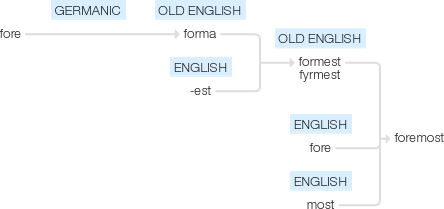Foremost
Old English formest, fyrmest, from forma ‘first’ (ultimately a superlative formed from the Germanic base of fore) + -est1. Compare with first and former1. The current spelling arose by association with fore and most.
wiktionary
From Old English formest, fyrmest(“earliest, first, most prominent”), from Proto-Germanic *frumistaz, from the locative stem *fur-, *fr- + the superlative suffix *-umistaz, stem ultimately from Proto-Indo-European *pr-. The suffix *-umistaz was a compound suffix, created from the rarer comparative suffix *-umô (as in Old English fruma) + the regular superlative suffix *-istaz (English -est); *-umô in turn is from Proto-Indo-European *-mHo-.
Cognate with Old Frisian formest, Gothic 𐍆𐍂𐌿𐌼𐌹𐍃𐍄𐍃( frumists). See for, first and Old English fruma for more. Partially cognate to primus, from Proto-Indo-European *pr- + Latin superlative suffix -imus, from Proto-Indo-European *-mHo-.
A comparative former was back-formed analogically, leaving the m from *-umô in place. Later the Old English suffix complex -(u)m-est was conflated with the word most through folk etymology, so that the word is now interpreted as fore + -most.
etymonline
foremost (adj.)
Middle English formest, from Old English fyrmest, formest "earliest, first, most prominent," from Proto-Germanic *furmista-/*frumista- (related to Old English fruma "beginning"), from PIE *pre-mo-, suffixed (superlative) form of root *per- (1) "forward," hence "through, in front of, before, first" + additional superlative suffix -est. For the -m-, see -most, and compare similarly formed Old Frisian formest, Gothic frumists. Altered on the assumption that it is a compound of fore and most. The same compound without the superlative -m- is first. Also in Old English as an adverb, "first of all, at first, in the first place."
